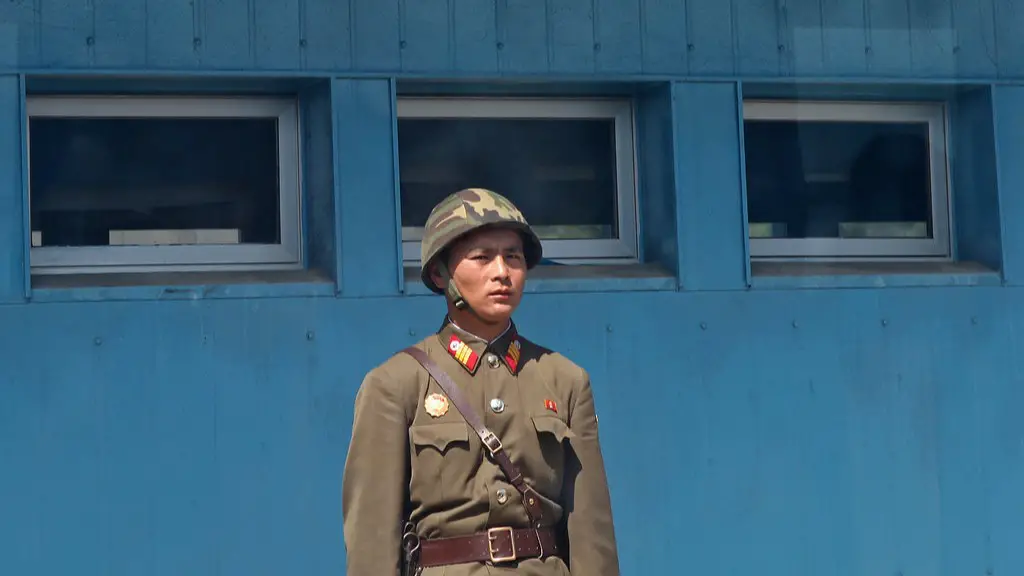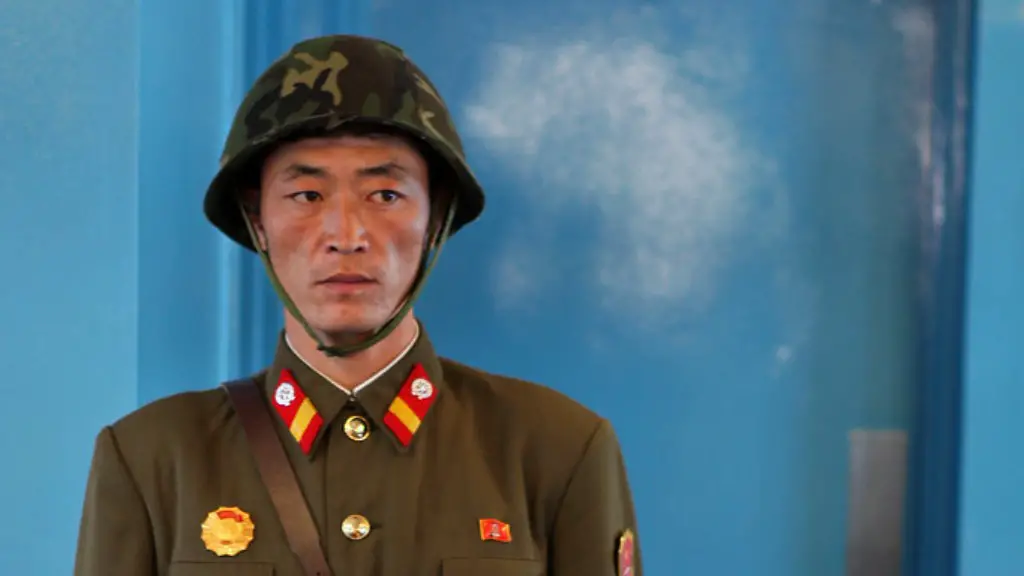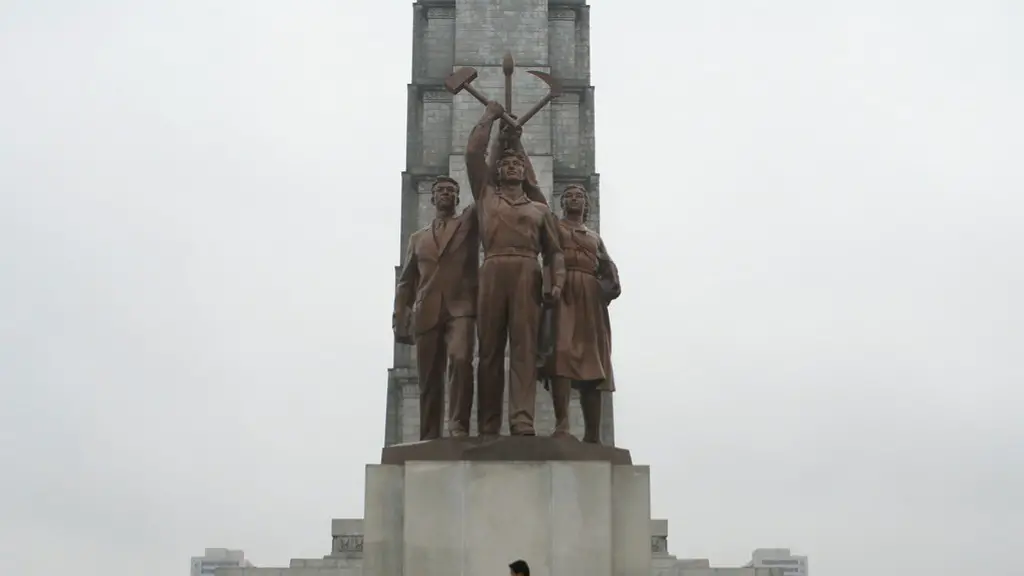North Korea is a country synonymous with nuclear weapons. Its belligerent attitude and threatening rhetoric have made it a target of the international community, and its development of nuclear weapons has been met with sanctions, diplomatic censorship and international rebuke. But what could happen if North Korea were to ever actually deploy a nuclear weapon? This article will explore the potential targets of a North Korean nuke and some of the potential implications that could result.
North Korea’s nuclear program has been a source of contention for decades. The country has conducted six nuclear tests, the last of which was in 2017, and it is estimated to possess up to 60 nuclear warheads. It is also believed to have a potential capability to effectively target targets both in its own region and farther abroad. According to a report from the Institute for Science and International Security, North Korea tested a ballistic missile in 2018 that may possess the capability to reach parts of the United States.
The most likely target of a North Korean nuclear weapon is South Korea. The two countries share a border, and South Korea has long been an economic and military ally of the United States and its other allies in Asia. That makes South Korea a prime target for North Korea as a demonstration of its power. In addition, South Korea also has a larger population than North Korea, and its cities are more densely packed, making it a more enticing target.
Closely following South Korea on the list of potential targets is Japan. As a fellow regional ally of the United States, North Korea would likely view a strike against Japan as a way to send a message of strength. Japan is not only a key economic partner of the U.S., but it is also home to a large number of American military bases and personnel. A strike against this country could do significant damage and destruction to the U.S. forces there, as well as interrupt the functioning of the Japanese economy.
The United States is also a potential target of North Korean aggression. North Korea has previously demonstrated its intent to acquire the capability to strike the United States with a nuclear weapon, and speculation continues to swirl around the possibility. A successful launch of a nuclear weapon against the United States mainland could result in large-scale destruction and death. It could also potentially trigger all out war and a further escalation of tensions between North Korea and the U.S.
Experts believe that if North Korea were to actually deploy a nuclear weapon, it would likely be in an attempt to send a message rather than to inflict massive destruction. This message could be to demonstrate its strength and capability, or to pressure the international community into taking certain actions. Still, a successful launch could still cause significant destruction and death, as well as trigger a major international crisis.
Geopolitical Risks
If North Korea were ever to use a nuclear weapon, the repercussions could be serious. It could trigger an international crisis with far-reaching consequences. It could also start an arms race in the region, as other countries seek to develop their own nuclear weapons as a deterrent. In addition, a nuclear strike could destabilize the region and have a significant economic impact, as countries scramble to respond.
Regional allies to North Korea, such as China, could be put in a difficult position if North Korea irresponsibly deploys a nuclear weapon. China has taken a hard stance against North Korea’s nuclear program and has regularly implemented sanctions against the country. In the event of a North Korean nuclear strike, China could be dragged into the conflict and forced to take more aggressive action against North Korea in order to maintain its regional credibility.
There could also be further implications for the United States. If North Korean aggression were to threaten the U.S. mainland, it is likely that the U.S. government would take action. This could include military action or economic retaliation, or both. Such measures could put the U.S. at odds with China or other regional allies and further cause instability.
As North Korea continues its pursuit of nuclear weapons, the threat of a nuclear strike hangs over the region. As such, it is of utmost importance that all involved parties do what they can to prevent such a scenario from occurring.
International Responses
The international community has taken a strong stance against North Korea’s nuclear ambitions. The United Nations has imposed numerous sanctions against the country, and it has continued to express its unease about the situation. In addition, the U.S. has frequently engaged in diplomatic talks with North Korea in an attempt to dissuade the country from further developing its nuclear program or launching a strike.
China has also become increasingly involved in attempts to rein in North Korea’s nuclear ambitions. In addition to imposing economic sanctions on North Korea, China has also engaged in its own diplomatic efforts to try and coax North Korea into giving up its nuclear ambitions.
Other countries in the region have also been working to de-escalate tensions in the region. South Korea, in particular, has taken the lead in trying to foster a diplomatic solution to the situation. The country has sought to engage in talks with North Korea and has attempted to create a more peaceful atmosphere in the region.
The United States and its allies in Asia are also pursuing their own efforts. In addition to diplomatic measures, the U.S. is also engaged in economic sanctions and military action against North Korea. The U.S. and its allies have repeatedly warned that any attempt by North Korea to launch a nuclear strike would be met with swift and decisive retaliation.
Potential Outcomes
It is clear that North Korea’s nuclear ambitions pose a major risk to international security. However, it is difficult to predict exactly how the situation will unfold. It is possible that current diplomatic efforts will be successful and North Korea will be dissuaded from taking military action. It is also possible, however, that diplomatic efforts will fail and North Korea will launch a strike, potentially with disastrous consequences.
In the event of a nuclear strike, it is likely that the United States and its allies would take swift action and respond with overwhelming force. Such a scenario could potentially spark an all out war between North Korea and the U.S. and its allies, damaging not only the region but also the global economy.
Whatever the outcome, it is clear that North Korea’s nuclear ambitions pose a real threat and that the international community must continue to work together to seek a peaceful resolution.
International Sanctions
The international community has taken a range of measures to try and dissuade North Korea from deploying a nuclear weapon. The United Nations and the international community have imposed a range of sanctions against the country. These sanctions have targeted North Korea’s major industries and resources, including its foreign investments, banking operations, and imports and exports.
The United States and other countries have also implemented their own sanctions against North Korea. These sanctions are intended to put economic pressure on North Korea in the hopes of deterring it from further developing its nuclear program or attempting to launch a nuclear strike.
In addition to economic sanctions, the United States and other countries have also engaged in military operations in the region. These operations include intelligence gathering, military exercises, and the deployment of military assets in the region. These actions are intended to demonstrate a commitment to regional security and to show North Korea that any attempt to launch a nuclear strike will be met with overwhelming force.
Though these measures have not been successful in preventing North Korea from developing its nuclear program, they have succeeded in pressuring the country to keep it from launching a nuclear attack.
International Politics
International politics has been a major factor in the North Korea situation. Though the United Nations and the U.S. have taken steps to impose sanctions and demonstrate their commitment to deterring North Korea from deploying a nuclear weapon, there are still divisions between international powers.
China is a key player in the situation, as it is North Korea’s closest ally. China has long advocated for a diplomatic solution to the situation and has sought to use its influence to persuade North Korea to abandon its nuclear ambitions. The United States, however, has taken a more aggressive stance and has continued to call for harsher sanctions against North Korea.
Other countries in the region, such as South Korea and Japan, have also taken their own stances on the situation. Both of these countries have expressed support for economic and diplomatic measures against North Korea, but have also called for stronger measures, including the possibility of military action.
It is clear that the situation surrounding North Korea is complex and that different countries have their own interests in the matter. It is unclear what will happen in the future, but it is clear that the diplomatic and military efforts of the international community will have an essential role in determining the outcome.





